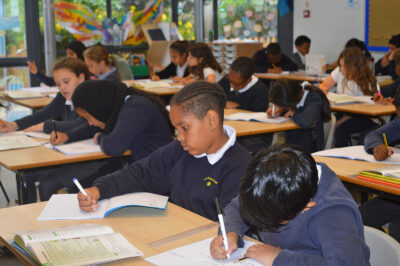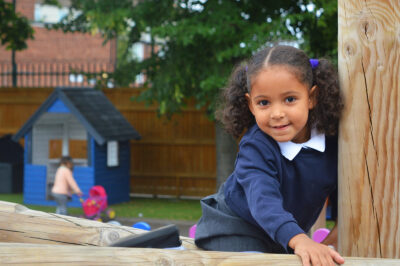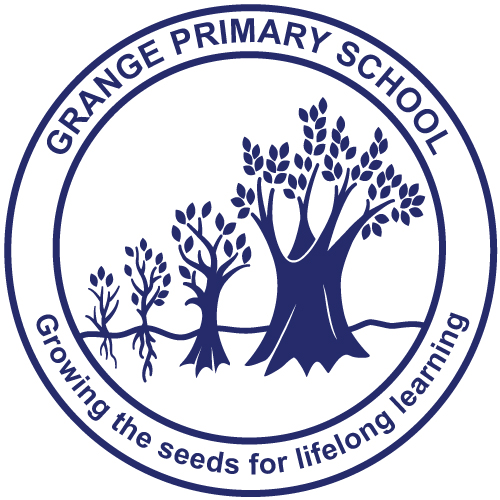Phonics and reading
Learning to read is a fundamental part of a child’s education as they need to read fluently and confidently to access all areas of learning and prepare them for the next stage in their life.
Reading is given high status at Grange and is at the heart of everything that we do. We aim to teach the children the skills to enable them to read well but we also aim to instil them with a love of reading and books.
In the nursery we focus on developing the children’s speaking and listening skills, developing their language and vocabulary through games, songs, stories, rhymes, role play, imaginative play and the introduction of high quality books.
The children are then introduced to phonics through the structured approach of Read, Write Inc (RWI). RWI is taught in daily hour sessions with small groups of children from the reception class and KS1. As their phonic knowledge increases the children are then able to apply their sounds to their reading and spelling.
We broaden and extend the range of the children’s reading and writing by encouraging them to read and write daily through guided reading lessons, Literacy and Language lessons (Year 2 to Year 6), and through writing opportunities both in literacy lessons and in learning extended across the curriculum. We provide high quality texts, both fiction and non fiction, cross curricular units of work, drama workshops, storytellers and authors to instil a love of reading across the school.
To support their development in reading we use many reading schemes and all the books are banded so that the children know what reading books to choose at their reading level. The main reading schemes we use are Oxford Reading Tree and Rigby Star.
English at Grange
Weekly Lesson Structure
 English lessons focus on the teaching of a core text, supported by planning materials from CLPE. Each text will be taught in blocks of between two – four weeks and will lead up to a piece of extended writing every two weeks. CLPE plans can be used as a guide to shape lesson plans but it is the teachers’ responsibility to ensure weekly plans produce cover relevant national curriculum objectives for their year group, allow children to make progress within a lesson and show progression over the unit. Weekly overview plans will be completed on a weekly basis and should be saved in the relevant planning folder on the school system as well as well as being displayed in classrooms.
English lessons focus on the teaching of a core text, supported by planning materials from CLPE. Each text will be taught in blocks of between two – four weeks and will lead up to a piece of extended writing every two weeks. CLPE plans can be used as a guide to shape lesson plans but it is the teachers’ responsibility to ensure weekly plans produce cover relevant national curriculum objectives for their year group, allow children to make progress within a lesson and show progression over the unit. Weekly overview plans will be completed on a weekly basis and should be saved in the relevant planning folder on the school system as well as well as being displayed in classrooms.
There should be at least three pieces of recording in English books each week. As per the marking policy, children should receive a quality marked piece of feedback once per week. Teachers may choose to use self or peer assessment on other days.
During one lesson in the week, a whole class comprehension lesson will take place. This lesson may be planned from the class text being studied or from the Nelson Comprehension book. This should be recorded in English books and peer-assessed by children. Teachers should model reading skills and how to answer comprehension questions. Lessons may focus on a developing a particular reading skill that is a class weakness (identified from B-Squared assessment of testing) or a practice of a number of skills.
One lesson in the week will focus on the teaching of grammar. This should be contextualised through the core text being used in the unit. The Nelson Grammar programme may be used to support teachers in their planning of this lesson.
Approaches to Reading
Grange uses the Read Write Inc programme to deliver daily discreet phonics lesson in FS and KS1, enabling children to decode efficiently. This is continued for pupils in KS2, where necessary, to support children that are new to the country or children with learning needs to develop their decoding skills.
In KS1 and KS2, reciprocal reading sessions will take place daily to support children in continuing to build fluency in their reading as well as developing their comprehension skills. Teachers are expected to ensure their guided discussion groups with children are well planned and linked to NC objectives.
Once per week, children will have the opportunity to visit the school library. The teacher should use this time to read aloud to the children from the class text, share book recommendations, explain how to choose appropriate books and spend time reading with individual key children. Teaching assistants can support children in choosing, returning and borrowing books as well as reading one on one with key children.
Children are expected to read daily at home to encourage a love of reading as well as their fluency and comprehension. In FS and KS1, children take home a book from a levelled reading scheme selected according to their ability. Parents are encouraged to read with their child daily and record this daily in their reading log.
We recognise the value of adults (at home and in school) reading aloud to children, as such, all classes have at least thirty minutes per week scheduled whole class reading time in which teachers read a class book to their class. This book will be of a level higher than the children are able to read independently.
Reading is assessed using teacher assessment in reciprocal reading and comprehension lessons, as well as summative assessments half-termly using the ‘PIRA’ scheme.
Approaches to Writing
Writing is taught through a combination of approaches:
– Whole class shared/modelled writing
-Guided writing in groups with the teacher
– Editing and redrafting alongside learning partners
– Drama and role play activities
– Use of high quality texts to provide good models of writing.
– Contextualised grammar teaching
Children will be taught the writing process: preparation, composition, review, and publication. Each piece of extended writing children produce will be developed through this process: planning, shared composition, composition, editing, redrafting. Children will complete an extended piece of writing in their Extended Writing books once every two weeks. All weekly English lessons building up to this will focus on preparation for this Writing based around the Core Text planning.
Prior to children commending their extended writing, shared writing from the class teacher should take place. This may model any section of the writing to be completed – beginning, middle or end. Teachers may wish to prepare this in advance and should take suggestions from the children whilst completing the shared writing. The teacher should narrate how they include key features, edit, improve and check their writing. Children should be involved in this process through partner discussion about word choices, possible sentences or success criteria and mini-whiteboard work.
Resources will always be provided for children in extended writing sessions such as word/vocabulary banks/modelled sections. EAL children may be supported through pre-teaching of vocabulary, Cloze paragraphs or other scaffolding supports. WELL models should be produced to demonstrate the writing task being undertaken. These can then be dissected by the class to produce toolkits or success criteria for the writing. Children should be taught not to simply from these ‘WELL’ models but to use them as aids to support them in structuring/with ideas for their work.
Writing will be teacher assessed and moderated each half-term. Judgements should be formed based on children’s performance in both ‘hot’ and ‘cold’ writing tasks.
Grammar and Punctuation
Grammar should be taught both in discreet lessons once a week as well as contextually through the class text being studied. Lessons can be planned according to objectives to be covered in the half term as identified in the medium-term planning for English or according class weaknesses (identified from B-Squared assessments or testing).
Teachers should use the grammar objective skills grids to aid them in recording which objectives have been taught and when. This will allow them to ensure they achieve coverage of all objectives over the year.
Grammar will be assessed at least once per term using the ‘Rising Stars’ programme.
Spelling
Spelling lessons will be taught several times a week dependent on Year Group.
Lessons should be planned using the No Nonsense Spelling scheme. The spelling rule practised in lessons should be used to help select the weekly homework spellings.
In one lesson per week, children will be tested on their spellings. Results should be recorded, alongside the spelling rules tested, in order to enable easier assessment so poor performing students can be tracked and relevant interventions given.
Handwriting
Handwriting will be taught using the Nelson Grammar Scheme for at least thirty minutes per week. Teachers should model the handwriting skill being taught as well as allowing time for children to practise. It is expected that teachers will circulate and give feedback throughout the lesson.
Children will be permitted to use a blue handwriting pen in their English and Extended Writing books if their handwriting is clear, neat and joined to a high standard. If children have achieved the standard necessary to write in pen then they should always use this implement instead of switching to pencil (unless their handwriting has deteriorated). Neat, cursive handwriting is a priority and children must be encouraged, taught to join as this is an expectation from Year 2 onwards.
Book covers should only be written by adults and not children.
Mathematics at Grange
Ethos
At Grange, we are committed to ensuring that our pupil become masters in mathematics. By the term ‘master’ we mean that each child develops a solid understanding of the maths that has been taught to enable them to move on to more advanced material. We aim for our pupils to acquire a deep, long-term, secure and adaptable understanding of the subject through:
- the use of concrete objects to act out an idea or skill
- visual, pictorial representations e.g. bar models to represent problems
- abstract representation – the symbolic stage where there is an understanding of formal methods
We encourage our pupils to adopt an ‘I can’ attitude towards learning. We plan lessons that encourage pupils to:
- enjoy excelling in maths
- become enthusiastic learners
- explain what they are in their learning and why
- believe that by working hard at maths they can succeed
Key Principles
Key stage 1 – years 1 and 2
(Taken from the National Curriculum Mathematics programme of study, July 2014)
The principal focus of mathematics teaching in key stage 1 is to ensure that pupils develop confidence and mental fluency with whole numbers, counting and place value. This should involve working with numerals, words and the 4 operations, including with practical resources [for example, concrete objects and measuring tools].
Lower key stage 2 – years 3 and 4
(Taken from the National Curriculum Mathematics programme of study, July 2014)
The principal focus of mathematics teaching in lower key stage 2 is to ensure that pupils become increasingly fluent with whole numbers and the four operations, including number facts and the concept of place value. This should ensure that pupils develop efficient written and mental methods and perform calculations accurately with increasingly large whole numbers.
Upper key stage 2 – years 5 and 6
(Taken from the National Curriculum Mathematics programme of study, July 2014)
The principal focus of mathematics teaching in upper key stage 2 is to ensure that pupils extend their understanding of the number system and place value to include larger integers. This should develop the connections that pupils make between multiplication and division with fractions, decimals, percentages and ratio.
Implementation
As a school, all lessons are taught using the Maths No Problem scheme of work. The scheme provides high quality text books and professional development base on the teaching methods developed in Singapore and in line with The Primary National Curriculum for Mathematics 2014.
The Maths No Problem Lesson Structure
- In focus is a time for practical exploration and discussion from a question posed to the class.
- Let’s Learn is where the teacher collaboratively teaches children how to think through the concepts raised in the previous stage of the lesson using the physical resources as well as pictorial representations. This is where the purpose of the lesson is made clear.
- Guided Practice: Collaborative learning is encouraged at this stage where the children work through the high quality text books recording their We expect our students to select efficient methods, appropriate for the task given.
- Workbooks and Greater Depth: A chance for children to work independently (or with a partner) to explore the concept at greater depth. Where a child may still feel unsure about the concept, resources would still be encouraged as well as targeted adult support.
Foundation Stage
At Grange Primary School we believe that Early Years education should acknowledge and build upon the wealth of learning that children bring with them to school. Young children learn best through first hand experiences and interactions with the environment. Language and play are the main vehicles for learning through which children learn to enjoy and achieve and begin to make sense of the world.
We support learners through the planning, delivery and evaluation of Foundation Stage curriculum that reflects the social, emotional, physical and intellectual development of each individual child. Children will be involved in a range of whole school activities, which continue and are extended in Key Stages 1 and 2. We aim to stimulate learning through matching teaching techniques to a range of learning styles. Children experience a variety of indoor and outdoor activities and opportunities, which encourage them to be safe and healthy. These are planned to enable children to reflect and discuss their actions and their effect on others through constant support and circle time.
We develop gross and fine motor skills planning carefully, to cater for each child’s individual needs. We aim to offer an inclusive education within a culture of high expectations, which enables children opportunities to make a positive contribution to their own learning.
Transition to key stage 1 is planned through a series of learning activities, which include the PSHE programme, parent and carer links, working with outside agencies. We provide regular assessment of pupils’ progress and needs to facilitate appropriate planning for their next steps in learning.
Key Stage 1
 In KS1 we provide opportunities for each individual child to experience and enjoy a safe environment that will equip and prepare them for life choices and interaction in the wider world.
In KS1 we provide opportunities for each individual child to experience and enjoy a safe environment that will equip and prepare them for life choices and interaction in the wider world.
We plan for learning to be active and exciting by building on and extending the good practice laid down in the Foundation Stage. We aim to offer a topic based integrated curriculum, which focuses on creativity and child initiated learning, including access to outside play areas in the future. Children are encouraged to support each other’s learning through reading and writing buddies.
We celebrate and encourage achievement through a variety of activities including Good Work Assemblies, Concerts and Class Assemblies, in which we welcome parents, the community and other key stages.
Through PSHE, the curriculum and the involvement of the local and wider community where possible, we aim to develop personal, health, social and emotional skills within the key stage through after school and breakfast clubs, visits, speakers and presentations.
During their time in Key Stage 1 children are involved in routines, expectations and activities to build their capacity as independent learners. We encourage them to become more confident, building on their self esteem and supporting them to make more informed choices.
Key Stage 2
Our aim in KS2 is to equip our pupils with the confidence to think for themselves and to leave school with the life skills they will need to succeed in KS3 and beyond.
We aim to offer a rich, varied and creative curriculum which encourages each child to reach their full potential providing them with opportunities to become life long learners, sharing responsibility for their learning and well being. We encourage all adults at home, school and in the wider community to be involved in their development and growth. We intend to build on the rich learning experience that children have received in the earlier years and continue to offer a range of teaching strategies to enable them to enjoy their achievements. Our planning is inclusive and caters for individual needs and learning styles.
We will involve children in making choices and decisions with regard to their own roles and responsibilities within the school and the local community. As well as building on their experiences in Foundation Stage and Key Stage one, they will develop pastoral and leadership skills and responsibilities e.g. playground duties and meeting and greeting guests. They will be offered the chance to extend their learning and life experiences away from the school setting, through Citizenship Week, visits, residential trips and links with other schools and community groups.
The process of transition to secondary schools will be implemented through transition units developed in partnership with local secondary schools and include mentors, attending performances and visits to their chosen schools.
Parents Leaflets
Remote Education
Please click on the link to see our Remote education provision.

